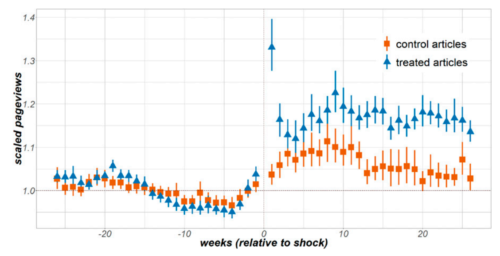In their recent paper on “content growth and attention contagion” (free preprint), researchers Kai Zhu, Dylan Walker and Lev Muchnik use Wiki Education’s Wikipedia Student Program as a natural experiment to study the effects of a sudden “shock” of new editing activity. They look at the set of about 3,300 articles that were substantially expanded by student editors during the Fall 2016 term, compared to a control group of similarly developed articles that weren’t worked on by any of our classes. The main idea is to look at what happens after the classes have ended and the students have (largely) stopped editing.

One major effect is an increase in pageviews — up 12%, on average, compared to the control group, and the more an article expanded, the larger the impact on pageviews. Not only that, but there’s a “spillover”, with increased pageviews for the articles linked to from the students’ articles — especially for newly added links. Along with more pageviews, these students’ articles got more edits from more unique editors after the class ended. As with the pageview effect, the more an article was expanded during the Fall 2016 term, the more edits and editors it was likely to attract afterwards. This increased attention for the students’ articles represents a combination of more traffic coming from related articles that link to them as well as more direct traffic from search results.
Their findings underscore the impact of our work, and reinforce a few ideas that are at the heart of what we do. First, it shows the impact and scale of our Wikipedia Student Program: student editors are doing so much to expand Wikipedia’s content gaps, especially in academic content areas, that it’s possible to study their activity and find statistically significant effects. (In an average month, our program participants represent nearly 20% of English Wikipedia’s new active editors.)
It also shows that the work students are doing isn’t just an “academic exercise”; it has an audience, and it matters enough that people are both reading it and building on it. Because of the way articles lead readers to explore the network of related articles, this “attention contagion” for substantially improved articles spills over to related articles, and this suggests that a particularly effective strategy is to focus on clusters of underdeveloped but important articles. That happens naturally in many of our Student Program courses, where the instructor guides their students to work on underdeveloped articles related to the course content. We’re also doubling down on this strategy for our Wiki Scholars & Scientists courses, where a cohort of experts comes together to learn how to apply their knowledge to a particular topic area — such as our recent courses focused on the COVID-19 pandemic.
Research like this is an important part of the Wikimedia ecosystem. Not only does this help quantify the impact of Wiki Education’s work, but it also offers insight for other Wikimedia program leaders interested in focusing editors on a cluster of underdeveloped but important articles. Wiki Education is always interested in independent researchers using our programs as a focus of academic study; for information on data available, reach out to us through our contact us page.
